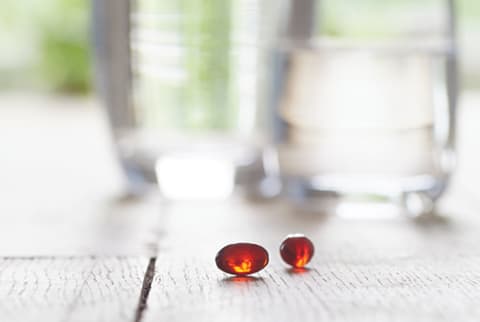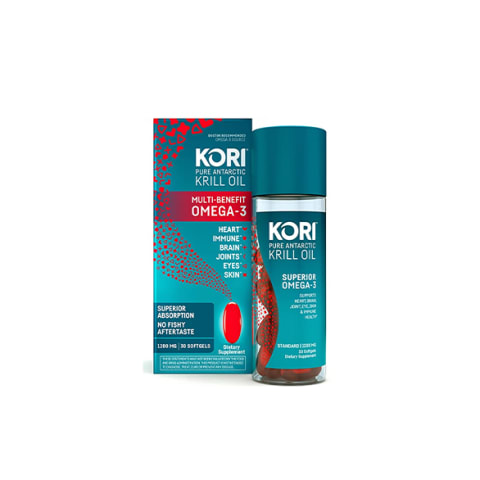Advertisement
Krill Oil Is Changing The Conversation We're Having About Omega-3s. Here's Why

In many ways, our body runs like a self-sufficient machine. But it still requires fuel to ensure things run smoothly, and that's where nutrition and supplements come in. For years, we've been perfecting our supplement lineup, and a source of omega-3s has always been a heavy hitter. You may know that these critical fats come in the form of fish oil, and these days, we're also learning more about the many benefits of krill oil… And as a result—the conversation we're having about omega-3s is diversifying.
Omega-3s & krill oil.
As a refresher: Omega-3s are fatty acids that wear a lot of hats when it comes to our whole-body health. DHA and EPA omega-3s provide our cells with nutrients1 that support a healthy immune system.* Research has shown that they also support normal triglyceride levels and may increase good cholesterol2, which is good news for our heart health.* They're even connected to the function of brain3 cell membranes, plus joint4, eye5, and skin health.*
So it's no wonder we want more of them—but fish oil isn't the only source we can take advantage of… Especially when we learn about all that Kori® Pure Antarctic Krill Oil brings to the table. But before we dive deeper, the question on most of our minds: What is krill oil? Krill are tiny, shrimplike crustaceans found in the Southern Ocean. And as it turns out, they make for an incredible source of omega-3s.
But why should we prioritize krill oil in our daily routine for omega-3s? We'll give you three reasons:
1. For one of the most natural forms of omega-3s.
It should go without saying that if we're going to take a daily supplement, it should really be as effective as possible. Kori Krill Oil delivers omega-3s in one of their most natural forms: phospholipids. Because each of our cells is surrounded by a phospholipid layer, and because many of our organs utilize omega-3s in their phospholipid form—this natural form enables superior absorption in the body.*
2. Krill oil has additional nutrients, like choline and antioxidants.
From head to toe, omega-3s play a leading role in our well-being. Just one daily serving of Kori Krill Oil provides the same amount of omega-3s as you would get on average from one to two servings of fish per week (the recommended weekly amount per the U.S. Dietary Guidelines): It's also a good source of choline and has the carotenoid astaxanthin. Choline is an essential nutrient that supports our brain and nervous system health6.* Astaxanthin is a powerful antioxidant that naturally gives krill oil such a distinctly bright red color!

3. There's nothing fishy about it.
Over the years, some lower-quality fish oil products have certainly gained a reputation—with fishy burps and an unpleasant aftertaste being a part of that. Thankfully, with Kori Krill Oil, there's nothing fishy whatsoever (literally, because it's shellfish): from the aftertaste to the way it's made. In fact, the operations behind Kori Krill Oil have earned the highest sustainability credentials for six years and running. Free of artificial colors, flavors, preservatives, and fishy burps? There's a reason this reinspired omega-3 routine has everyone talking.
A routine you'll love—proven.
We know that our well-being truly thrives on the routines that we come back to, day in and day out. But as the health and wellness world evolves—it's also important that we shake up our routines with the latest and greatest. As an omega-3 superfood, Kori Krill Oil is an ideal way for us to stay on top of our omega-3s. More than that: Krill oil is clinically shown7 to raise omega-3 levels8. Whether it's whole-body benefits, no more fishy aftertaste, or sustainability, Kori is changing the way we talk about omega-3s… And we're all ears.
8 Sources
- https://www.ncbi.nlm.nih.gov/pmc/articles/PMC6834330/
- https://www.ncbi.nlm.nih.gov/pmc/articles/PMC5827911/
- https://www.ncbi.nlm.nih.gov/pmc/articles/PMC3202024/
- https://pubmed.ncbi.nlm.nih.gov/17353582/
- https://www.ncbi.nlm.nih.gov/pmc/articles/PMC323657/
- https://www.ncbi.nlm.nih.gov/pmc/articles/PMC5579609/
- https://www.ncbi.nlm.nih.gov/pubmed/24304605
- https://www.ncbi.nlm.nih.gov/labs/pmc/articles/PMC4557744/



















